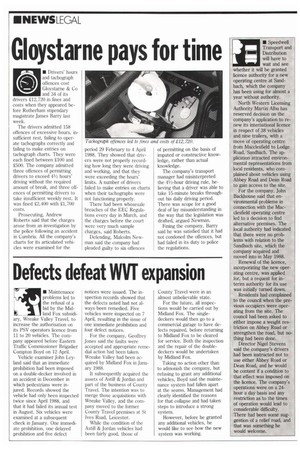Gloystarne pays for time
Page 22

If you've noticed an error in this article please click here to report it so we can fix it.
• Drivers' hours and tachograph offences cost Gloystame & Co and 34 of its drivers £12,720 in fines and costs when they appeared before Rotherham stipendary magistrate James Barry last week.
The drivers admitted 158 offences of excessive hours, insufficient rest, failing to operate tachographs correctly and failing to make entries on tachograph charts. They were each fined between £100 and £500. The company admitted three offences of permitting drivers to exceed 41/2 hours' driving without the required amount of break, and three offences of permitting drivers to take insufficient weekly rest. h was fined £2,400 with £1,700 costs.
Prosecuting, Andrew Roberts said that the charges arose from an investigation by the police following an accident in Cumbria. All the company's charts for its articulated vehicles were examined for the period 29 February to 4 April 1988. They showed that drivers were not properly recording how long they were driving and working, and that they were exceeding the hours' limits. A number of drivers failed to make entries on charts when their tachographs were not functioning properly.
There had been whosesale breaches of the EEC Regulations every day in March, and the charges before the court were very much sample charges, said Roberts.
Defending, Malcolm Newman said the company had pleaded guilty to six offences
of permitting on the basis of imputed or constructive knowledge, rather than actual knowledge.
The company's transport manager had misinterpreted the 41/2-hour driving rule, believing that a driver was able to take 15-minute breaks throughout his daily driving period. There was scope for a good deal of lay misunderstanding in the way that the legislation was drafted, argued Newman.
Fining the company, Barry said he was satisfied that it had not condoned the offences, but had failed in its duty to police the regulations.




































































































































































































